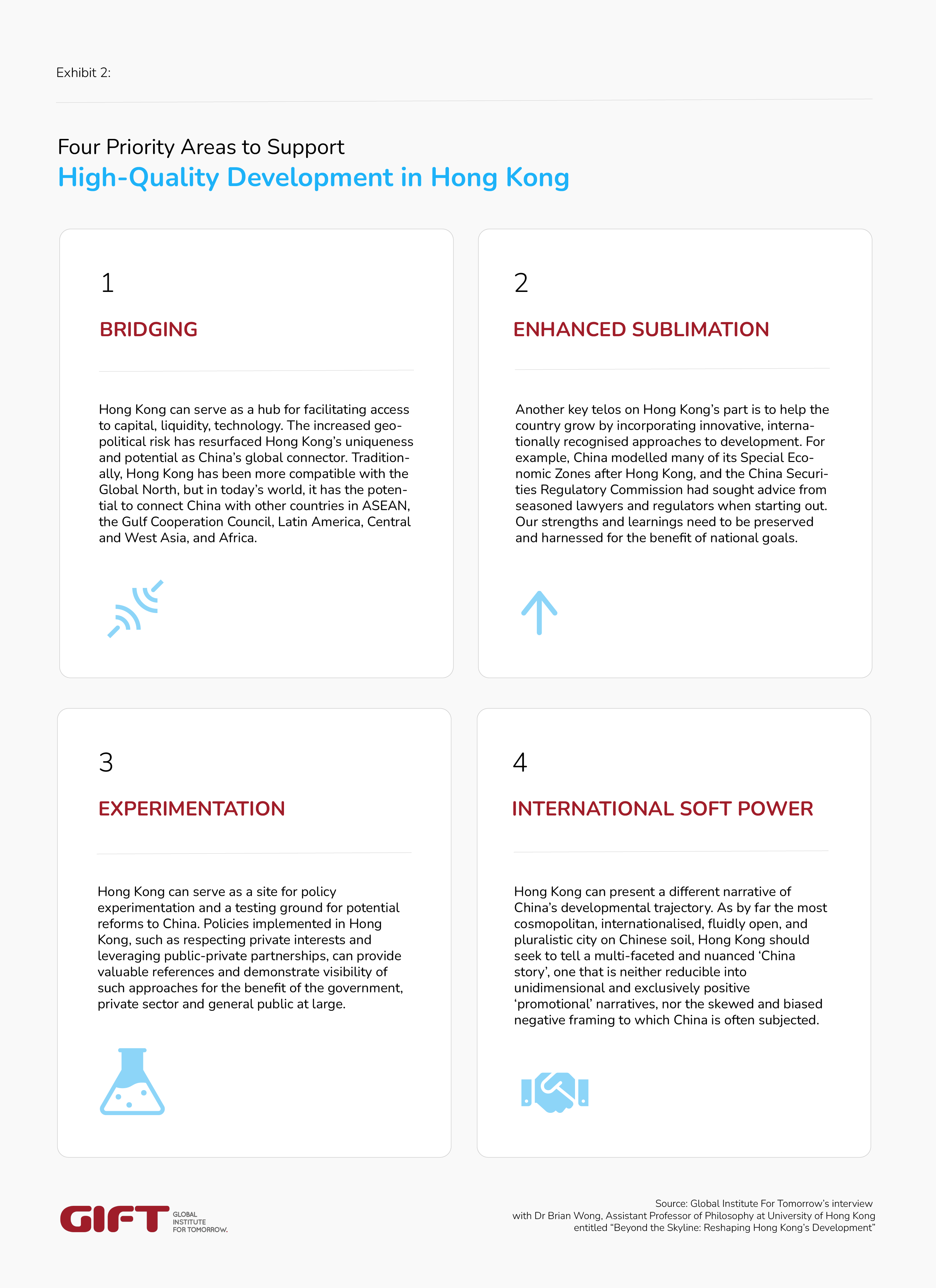In an exclusive interview, we sit with Dr Brian Wong, a leading voice in political theory and geopolitical strategy, to discuss the critical political landscape of 21st century China and Hong Kong. Our focus centres on the concept of High-Quality Development (HQD) and its profound implications for Hong Kong. Dr Wong unravels the intricate layers of HQD, providing us with a comprehensive understanding of its essence and exploring actionable strategies for Hong Kong to embrace this transformative approach.
Together, we embark on a thought-provoking exploration of eco-civilization, examining the vital role it plays in shaping Hong Kong's future. We explore areas of youth development, education, social well-being, and others, as Dr Wong shares his expert opinions on social and policy recommendations that can serve as catalysts for driving HQD in Hong Kong.
***
GIFT: What is your understanding of ‘High-Quality Development’ in relation to China’s national strategy?
Dr Brian Wong: I take ‘High Quality Development’ to be a question that can be broken down into three key boxes: the size of the pie, the distribution of the pie, and the ethos undergirding the pie.
To truly achieve high-quality development, all three boxes need to be checked simultaneously. This means fostering robust economic development and growth, while ensuring the benefits are distributed fairly and equitably across the national community and its wider network.
Note, ‘fair and equitable’ is not necessarily equal to absolute equality of resources. However, a ‘fair and equitable’ distribution does require a just distributive principle that aligns with the values, cultural norms, and dynamics of the society in question. That is, moral equality is relative to the society in which it functions.
Consider the United States, where resource distribution is not equal; nevertheless, the country’s political and economic system, built on capitalism, can still be perceived by many as fair. The promise of individual hard work leading to a proportional attainment of resources and wealth constitutes the initial intentions underlying the American political system. Yet it is important to acknowledge that over time, the advantages of the privileged in the system have become increasingly entrenched and persistent, thereby undermining the potential substantive fairness of the system.
1. The Size of the Pie
There is one school of thought – the de-growth approach to economics – which argues that an infinite expansion of the economy is fundamentally contradictory to the finite availability of resources. This suggests that growth is the antithesis of development.
However, this perspective overlooks a crucial point: development requires some upward momentum and growth along specific dimensions that expands the average person’s opportunities. While growth may not solely be defined by traditional metrics like GDP or GNI, it should be measured by other meaningful indicators. Ultimately development cannot thrive without some degree of growth in the overall economic landscape.
2. The Distribution of the Pie
When development and economic progress are disproportionately accrued at the top echelons of society, rather than reaching the middle and bottom segments, we produce an unjust model of societal development. In this situation, no matter what efforts the middle and bottom segments make, they do not reap the benefits. This is where a sound distribution of the pie is most crucial. It is essential for societies to determine what is good and what is bad, and to establish relevant metrics that determine what constitutes a fair distribution and implement measures to ensure opportunities for wealth creation are robustly justified and accessible to all. Thus, a multifaceted distribution algorithm is required to determine a just distribution.
This is where the concept of common prosperity comes into play. Common prosperity has often been misunderstood by those unfamiliar with China or by Western observers as advocating equal wealth across the board and for all. In reality, common prosperity is about achieving a justifiable and fair distribution of resources among all members of society. It envisions bringing prosperity to all, but not necessarily equal prosperity to all. The focus is on ensuring that the pie is distributed in a manner that upholds principles of justice and fairness, benefiting the common people as a whole.
3. Ethos of the Pie – Morality and the Common Good
High-Quality Development necessitates a collective commitment to a shared future for all, highlighting the significance of China’s eco-civilisation policy in relation to this concept. This policy serves as a framework to set necessary limitations on the means and the ends of development to ensure it remains within planetary boundaries. When viewed through the lens of eco-civilisation, high-quality development encompasses essential aspects of Chinese national development, including:
A. Acknowledging the pressing reality of the climate crisis we face as a global village and recognising that the climate polycrisis demands development strategies that prioritise sustainability and mitigate environmental degradation.
B. Embracing the profound and nuanced relationship between Chinese people and nature. This relationship forms the foundation for Chinese cultural icons, spiritual beliefs, and higher ideals, emphasising a holistic view of development that extends beyond mere economic gains.
C. Demonstrating China’s commitment to lead by example in how it approaches and pursues its own governance across national, provincial, and municipal levels, and stepping up to become one of the exemplary leaders within systems and institutions of global governance. This reflects China’s conviction to play a significant role in addressing global challenges.
D. Critically interrogating and channelling the true purpose of development. Is development solely aimed at catering to the needs of human beings, a small segment of the world we inhabit? Or should it encompass the well-being of the entire planet, including the environment and its diverse inhabitants, such as animals? Examining this question prompts a reevaluation of development paradigms and urges a shift towards more inclusive, sustainable, and morally conscious approaches.
GIFT: How can Hong Kong contribute to “High-Quality Development”?
Dr Brian Wong: Hong Kong's contribution to high-quality development behooves it to engage and reflect upon its dual identity: as a part of China and as a distinct city that can be differentiated organically from mainland Chinese cities; such differences should be in the interest of both the mainland and China. Only by embracing a dynamic ‘One Country, Two Systems’, can Hong Kong pursue genuinely pragmatic development while preserving the city's unique characteristics and continued liberalisation.
Hong Kong’s uniqueness stems from its status as the most international, capitalistic, and global city in China. Such uniqueness must and ought not be undermined by radical and atavistic forces seeking to polarise Hong Kong as “One Country, One System”, or by equally confounded and delusional forces who advocate a “Two Countries, Two Systems” approach.
To support high-quality development, Hong Kong can prioritise these four areas: bridging, enhanced sublimation/elevation, experimentation, and international soft power and reputation.



























